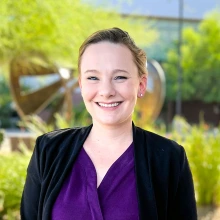
Co-Director Kathryn Emerick, MD
photo: Jamie Manser
The mental health crisis in the U.S. is well-documented and significantly impacted by the lack of available mental health providers. The situation is even more dire for moms; in 2024 there were fewer than 500 perinatal psychiatrists in the entire United States to cover an estimated 800,000 mothers who need care annually. In Arizona, we estimate there are fewer than 10 perinatal psychiatrists, and most do not take insurance. This means that other providers are, by necessity, taking care of our moms, yet no medical specialty currently requires formal training in perinatal mental health. This includes psychiatry, obstetrics, pediatrics, and primary care – the very specialties most likely to encounter individuals struggling with mental health challenges during pregnancy and the postpartum period.
Unsurprisingly, many physicians report that lack of education and training is one of the biggest barriers to delivering effective mental health care to perinatal patients.
Given the rising rates of perinatal mood and anxiety disorders (PMADs) and the fact that mental health issues and substance use are the leading causes of maternal death, improving access to perinatal mental health care must be a public health priority. Given the lack of perinatal psychiatrists in Arizona, we need to think about both traditional long-term strategies to increase the provider pipeline, and get creative about ways we can provide treatment to Arizona mothers right now.
Strategies to Improve Access and Build Workforce Capacity Now & In the Future
- Increase Provider Pipeline
Early exposure and dedicated training tracks within general psychiatry and OB/GYN residency programs would help close critical knowledge gaps. - Access Programs
Perinatal Psychiatry Access Lines, like APAL, offer real-time psychiatric consultation to help providers manage complex mental health needs in real time. APAL also offers training to increase capacity and confidence of providers over time. - Integrated and Co-Located Care
Embedding mental health professionals directly into OB/GYN, family medicine and pediatric care settings makes services more accessible, especially in rural or underserved areas. Collaborative care models also support earlier identification and treatment of PMADs.
Expanding access to perinatal psychiatric care will require a multi-pronged approach, but with investment in and commitment to the health of Arizona mothers and families, change is possible.

